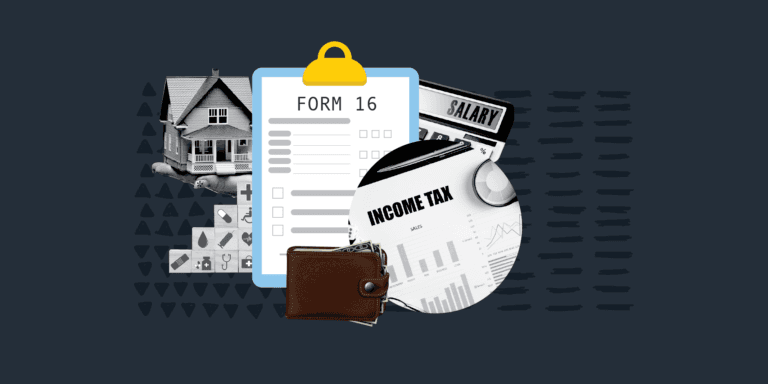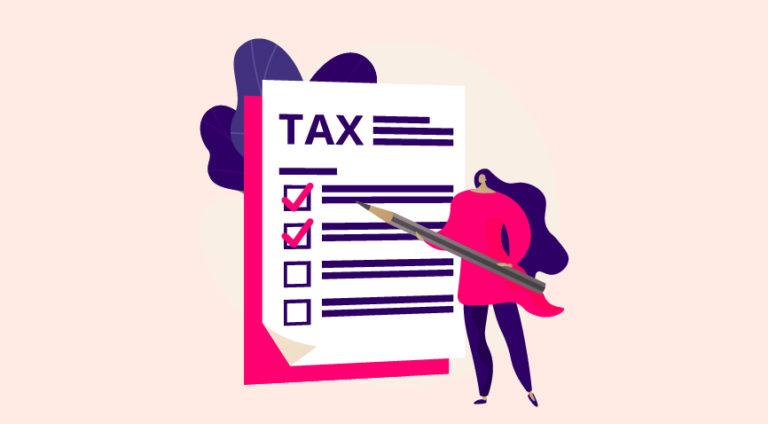Sample: What Deductions to Claim When Filing ITR?

To decrease taxable income and tax liability while filing Income Tax Returns (ITR), assessees can invest in various investment plans to avail deduction from their total income. Chapter VI A of the Income Tax Act, 1961 comprises various sub-sections that allow assessees to claim deductions from their gross total income. Such deductions include some tax-saving investments like pension funds, donations, insurance premiums, etc.
Let’s take a look at some of the sections under Chapter VI A of the Income Tax Act:
Section 80C (deduction in respect of investment in specified assets)
Deduction under this section can be availed only by individuals and Hindu Undivided Families or HUFs. The maximum amount of deduction allowed under this section is Rs 1.5 lakh. Here are some investment options for an assessee to avail benefits of deduction under this section:
- Public Provident Fund (PPF)
- Equity Linked Savings Schemes (ELSS)
- Employee Provident Fund (EPF)
- National Pension Scheme (NPS)
- Unit Linked Investment Plans (ULIPs)
While PPF offers fixed returns, investment instruments like ELSS, NPS and ULIPs provide returns that are market-linked. ELSS is a diversified equity mutual fund that helps the taxpayer in the following ways:
- Lowest Lock-in period
- 2x higher returns compared to Fixed Deposits or PPF
- Best tax-saving investment under 80C with an option to invest monthly
Moreover, ELSS gives up to 15% to 18% returns with a lock-in period of 3 years, and is partially taxable on maturity. An assessee can directly invest in ELSS mutual fund online. It is the only mutual fund eligible for tax deduction under Income Tax Act, 1961.
Section 80CCC (deduction in respect of contribution to the pension fund)
Deduction under this section can be availed only by individuals by investing in certain pension funds. The maximum amount of deduction allowed under this section is Rs 1.5 lakh.
Section 80CCD (deduction in respect of contribution to pension scheme notified by the Central Government)
Deduction under this section can be availed only by individuals. Deduction under section 80CCD(1) can be availed on amount deposited in pension accounts. The maximum claim can be anything less than 10% of the salary of salaried individuals and less than 20% of the GTI of an self-employed individual. Additional deduction of up to Rs 50,000 is allowed under section 80CCD(1B) for any investment in the NPS or Atal Pension Yojana.
Deduction under section 80CCD(2) is restricted to 14% of the salary if the Central Government contributes, and 10% of the salary if any other employer contributes.
- Section 80D (deduction in respect of medical insurance premium)
Up to Rs 25,000 deduction is allowed under section 80D if you pay any premium under a policy for the health of self, spouse and dependent children or make any contribution to Central Government’s Health Scheme.
A further deduction up to Rs 25,000 is allowed for insurance on the health of parents of the assessee. If the parent is a senior citizen, i.e. 60 years or more during the relevant previous year, the limit is increased to Rs 50,000.
Moreover, a deduction up to Rs 5,000 regarding preventive health check-up is allowed with an overall limit of Rs 25,000 or Rs 50,000.
- List of various deductions regarding payments
The deduction allowed under section 80DD regarding maintenance including medical treatment of a dependent person with a disability.
The deduction allowed under section 80DDB is for medical treatment of certain specified diseases.
The deduction allowed under section 80E holds interest on loan taken for higher education.
- List of various deductions on certain incomes
Deductions in Chapter VI-A under heading ‘C’ include certain incomes as per provisions made under the Income Tax Act, 1961 are included in sections 80IA, 80IAB, 80IAC, 80IB, 80IBA, 80IC, 80IE, 80JJA, 80JJAA, 80LA, 80M, 80P, 80PA, 80QQA, and 80RRB.
- List of various deduction in other income
Deductions regarding other income as per the provision of Income Tax Act, 1961 are included in sections 80TTA and 80TTB.
- Other deductions
Deductions under section 80U are reserved for people with any disability.

Latest Blogs
Explore how Google’s 2025 AI search updates triggered ranking chaos. Learn actionable strategies to adapt your SEO for AI Overviews, zero-click searches, and SERP volatility. Stay ahead now.
Learn how to rank on AI search engines like ChatGPT, Perplexity, and Gemini by optimizing your content for authority, structure, and relevance. Stay ahead in AI-driven search with this strategic guide.
Explore the best healthcare SEO services for your medical practice. Improve online visibility and effectively reach more patients in need of your services.
Get your hands on the latest news!
Similar Posts

Accounting and Taxation
3 mins read
Sample: How to File Your Income Tax Returns (ITR) Online?

Accounting and Taxation
3 mins read
Sample: Things to Keep in Mind When Filing Income Tax Returns (ITR) After Retirement

Accounting and Taxation
3 mins read